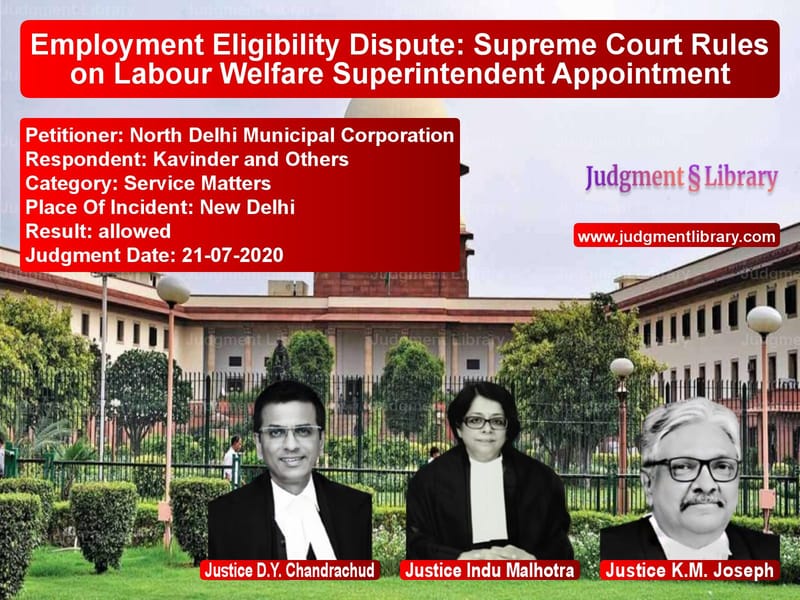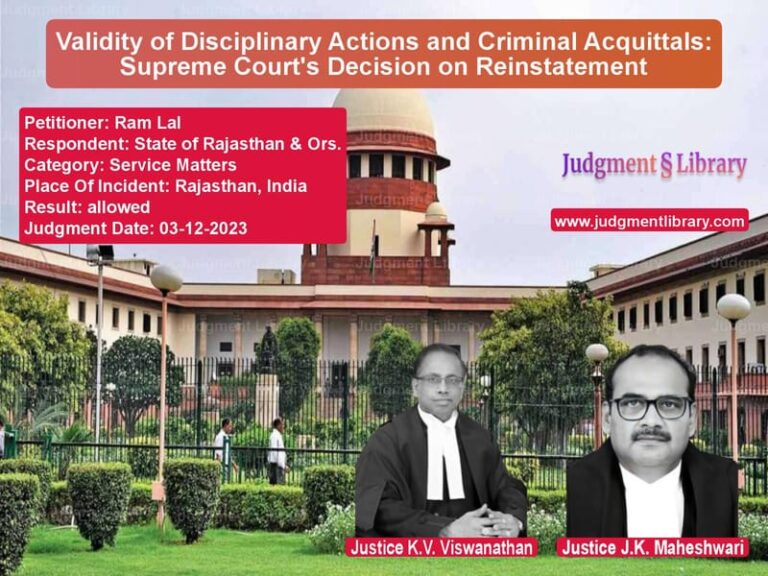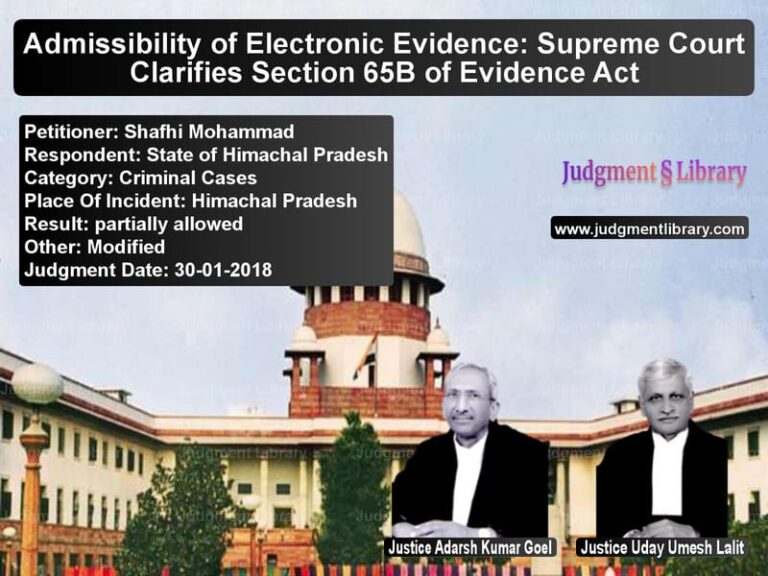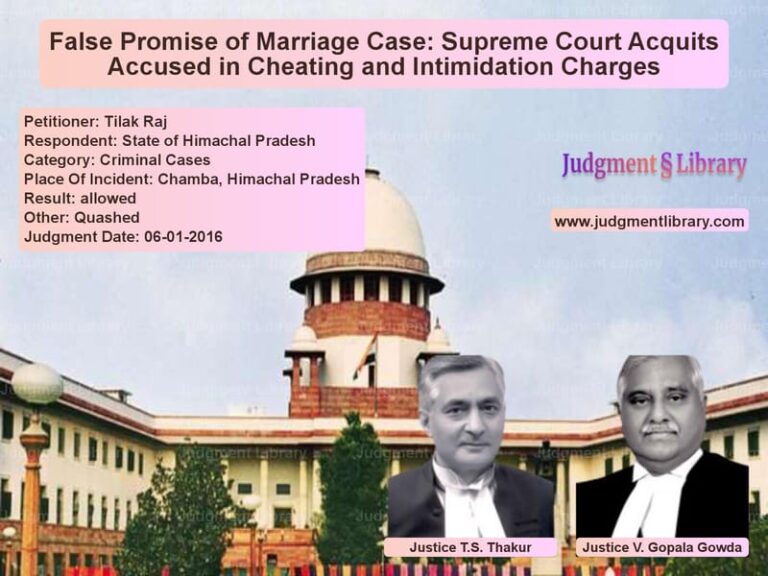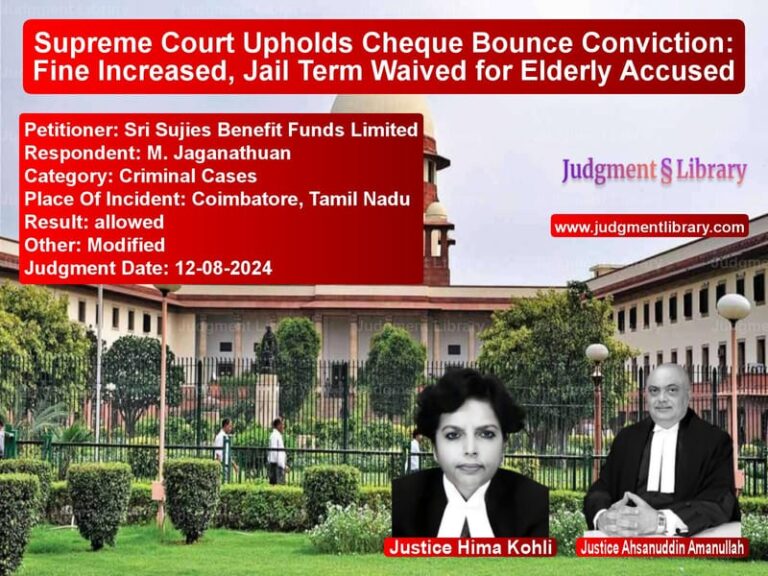Employment Eligibility Dispute: Supreme Court Rules on Labour Welfare Superintendent Appointment
The Supreme Court of India recently ruled on a significant employment eligibility dispute in the case of North Delhi Municipal Corporation vs. Kavinder & Others. The case revolved around the qualifications required for the post of Labour Welfare Superintendent in the Municipal Corporation of Delhi (MCD). The issue at hand was whether an MBA degree with certain subjects related to labour welfare and industrial relations could be considered equivalent to the prescribed qualifications for the post.
The appellant, North Delhi Municipal Corporation, contested the decisions of the Central Administrative Tribunal (CAT) and the Delhi High Court, both of which had ruled in favor of the respondent, Kavinder, by declaring him eligible for the position. The Supreme Court, however, overturned these decisions and upheld the original recruitment criteria set by the MCD.
Background of the Case
The dispute arose when the MCD advertised for the post of Labour Welfare Superintendent, specifying the following essential qualifications:
- A degree from a recognized university or equivalent.
- A post-graduate degree/diploma in Social Work, Labour Welfare, Industrial Relations, Personnel Management, or any other allied subject from a recognized university/institution or equivalent.
The respondent, Kavinder, applied for the position and appeared in the written examinations conducted by the Delhi Subordinate Services Selection Board (DSSSB). Despite passing the exam, his candidature was rejected on the grounds that he did not meet the educational qualification criteria. Kavinder then approached the CAT, arguing that his MBA degree, which included subjects related to Human Resource Management and Industrial Relations, should be considered equivalent to the required qualifications.
Proceedings Before the Tribunal and High Court
The Central Administrative Tribunal (CAT) ruled in favor of Kavinder, holding that his MBA degree, which covered Human Resource Management and Industrial Relations, was sufficient to meet the qualification requirements. The Tribunal reasoned that:
- The respondent had studied relevant subjects within his MBA curriculum.
- Since the recruitment advertisement allowed for “any other allied subject,” his MBA degree could be considered equivalent.
- Having cleared the competitive exam, he should not be denied appointment based on a technical interpretation of qualifications.
The Delhi High Court upheld the CAT’s decision, dismissing the MCD’s appeal.
Supreme Court’s Analysis and Judgment
The Supreme Court framed the key issue as follows: Whether an MBA degree, with select subjects related to labour welfare and industrial relations, could be considered equivalent to a post-graduate degree/diploma in the prescribed fields?
The Court ruled in favor of the North Delhi Municipal Corporation, setting aside the decisions of the CAT and the High Court. The key findings of the Supreme Court were:
1. The Recruitment Advertisement Clearly Defined the Essential Qualifications
The Court noted that the advertisement explicitly required a degree/diploma in specific fields—Social Work, Labour Welfare, Industrial Relations, or Personnel Management. The Court observed:
“The eligibility requirements stipulated in the advertisement are that the candidate must have a post-graduate degree or diploma in (i) Social Work; (ii) Labour Welfare; (iii) Industrial Relations; (iv) Personnel Management; or (v) any other allied subject.”
The Court emphasized that recruitment authorities had the right to set clear eligibility conditions and that any relaxation in qualification criteria should be based on well-defined equivalence standards.
2. Mere Inclusion of Related Subjects Does Not Make an MBA Degree Equivalent
The Supreme Court rejected the argument that the presence of certain subjects in the MBA curriculum, such as Human Resource Management and Industrial Relations, made it equivalent to the specified qualifications. The Court stated:
“Studying these two subjects would not lead to the conclusion that the first respondent holds a post-graduate degree or diploma in the disciplines specifically mentioned in the advertisement or in any allied subject.”
The Court held that an MBA degree in itself does not qualify as an allied subject unless explicitly stated in recruitment rules.
3. The Employer Has the Right to Determine Qualification Equivalence
The Court emphasized that the recruitment body, in this case, the MCD, was best suited to determine whether a particular qualification met the prescribed standards. Unless the decision of the employer was arbitrary or perverse, judicial intervention was unwarranted. The Court noted:
“The appellant as an employer was best suited to judge whether the degree of the first respondent was in an allied subject. The Tribunal had no reason to interfere unless the assessment was contrary to prescribed requirements.”
Accordingly, the Supreme Court ruled that the CAT had erred in extending eligibility to the respondent based on an incorrect interpretation of qualification equivalence.
Final Verdict
The Supreme Court allowed the appeal, setting aside the High Court’s judgment and dismissing the original petition filed by Kavinder before the CAT. The Court held that he was not eligible for the post, stating:
“For the above reasons, we are of the view that the findings of the Tribunal and the High Court are erroneous. We accordingly allow the appeal and set aside the impugned judgment.”
Key Takeaways from the Judgment
- Recruitment authorities have the right to prescribe specific educational qualifications for job posts.
- Not all degrees with related subjects can be considered equivalent to prescribed qualifications.
- Judicial intervention should be limited unless there is a clear case of arbitrariness in recruitment decisions.
- Employment eligibility criteria must be interpreted strictly, adhering to the text of recruitment advertisements.
Conclusion
This case highlights the importance of strictly adhering to eligibility requirements in public sector employment. The ruling serves as a precedent for future disputes where candidates claim equivalence based on related coursework. The decision reaffirms that recruitment authorities must have a clear and consistent approach to educational qualification criteria and that courts should not interfere unless recruitment decisions are arbitrary.
Petitioner Name: North Delhi Municipal Corporation.Respondent Name: Kavinder and Others.Judgment By: Justice D.Y. Chandrachud, Justice Indu Malhotra, Justice K.M. Joseph.Place Of Incident: New Delhi.Judgment Date: 21-07-2020.
Don’t miss out on the full details! Download the complete judgment in PDF format below and gain valuable insights instantly!
Download Judgment: North Delhi Municipa vs Kavinder and Others Supreme Court of India Judgment Dated 21-07-2020.pdf
Direct Downlaod Judgment: Direct downlaod this Judgment
See all petitions in Recruitment Policies
See all petitions in Employment Disputes
See all petitions in Public Sector Employees
See all petitions in Contractual Employment
See all petitions in Promotion Cases
See all petitions in Judgment by Dhananjaya Y Chandrachud
See all petitions in Judgment by Indu Malhotra
See all petitions in Judgment by K.M. Joseph
See all petitions in allowed
See all petitions in supreme court of India judgments July 2020
See all petitions in 2020 judgments
See all posts in Service Matters Category
See all allowed petitions in Service Matters Category
See all Dismissed petitions in Service Matters Category
See all partially allowed petitions in Service Matters Category

